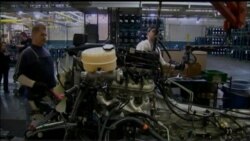A harsh winter appears to have battered the U.S. economy more than first thought.
The Commerce Department says the economy actually shrank a full percent in the first three months of the year - worse than initial estimates that showed the economy grew, but just barely, by one-tenth of one percent between January and March.
The latest estimate of gross domestic output marks the first contraction in three years. But, analysts are confident the slowdown is temporary.
A colder than expected winter gets much of the blame for the slowdown in U.S. productivity, but analysts say it’s more complicated than that.
“Consumers spent at a healthy rate in the first quarter despite the nasty weather in the eastern two-thirds of the country," said Mark Hamrick, the Washington bureau chief at Bankrate.com. "It was really businesses holding back the economy."
Hamrick says businesses may have inadvertently slowed U.S. growth - reducing their stockpiles of inventory and cutting back on investments in anticipation of reduced consumer demand.
On Wall Street, investors seemed unfazed by the disappointing news - with the major stock indexes remaining in positive territory.
Hamrick says that’s because investors are already looking forward to the rest of the year.
“We’re really more concerned about what’s happening in the current quarter on out towards the second half of the year," he said. "And it's widely believed that growth in the current quarter is really making up for, perhaps even more than making up for - that contraction in the first quarter."
Some estimates suggest the U.S. economy could grow between 4 and 5 percent in the second half of 2014. Less certain is the outlook for the housing market.
RealtyTrac’s Daren Blomquist says home sales and prices have slowed dramatically since 2013.
“We are seeing decreases in sales volume in the first quarter and even into April, but I don’t think it’s just about the weather," he said. "I think the more fundamental issue is the low inventory."
Economists say the smaller inventories may be the result of fewer Americans losing their homes to foreclosure - along with tighter bank lending guidelines.
On the bright side, the U.S. job market continues to improve. A new report shows the number of unemployed workers seeking government assistance fell by 27,000 this week - that's close to a seven-year low reached earlier this month.
The Commerce Department says the economy actually shrank a full percent in the first three months of the year - worse than initial estimates that showed the economy grew, but just barely, by one-tenth of one percent between January and March.
The latest estimate of gross domestic output marks the first contraction in three years. But, analysts are confident the slowdown is temporary.
A colder than expected winter gets much of the blame for the slowdown in U.S. productivity, but analysts say it’s more complicated than that.
“Consumers spent at a healthy rate in the first quarter despite the nasty weather in the eastern two-thirds of the country," said Mark Hamrick, the Washington bureau chief at Bankrate.com. "It was really businesses holding back the economy."
Hamrick says businesses may have inadvertently slowed U.S. growth - reducing their stockpiles of inventory and cutting back on investments in anticipation of reduced consumer demand.
On Wall Street, investors seemed unfazed by the disappointing news - with the major stock indexes remaining in positive territory.
Hamrick says that’s because investors are already looking forward to the rest of the year.
“We’re really more concerned about what’s happening in the current quarter on out towards the second half of the year," he said. "And it's widely believed that growth in the current quarter is really making up for, perhaps even more than making up for - that contraction in the first quarter."
Some estimates suggest the U.S. economy could grow between 4 and 5 percent in the second half of 2014. Less certain is the outlook for the housing market.
RealtyTrac’s Daren Blomquist says home sales and prices have slowed dramatically since 2013.
“We are seeing decreases in sales volume in the first quarter and even into April, but I don’t think it’s just about the weather," he said. "I think the more fundamental issue is the low inventory."
Economists say the smaller inventories may be the result of fewer Americans losing their homes to foreclosure - along with tighter bank lending guidelines.
On the bright side, the U.S. job market continues to improve. A new report shows the number of unemployed workers seeking government assistance fell by 27,000 this week - that's close to a seven-year low reached earlier this month.






